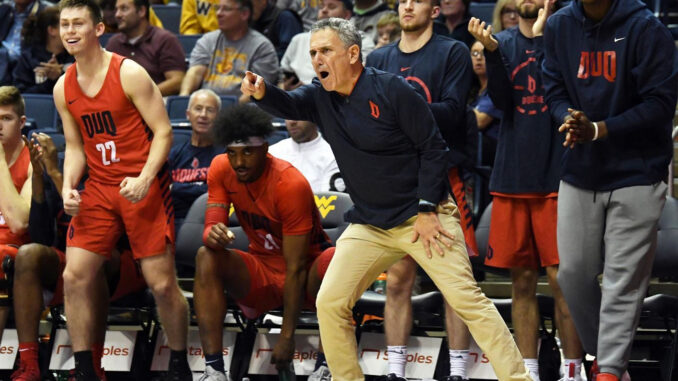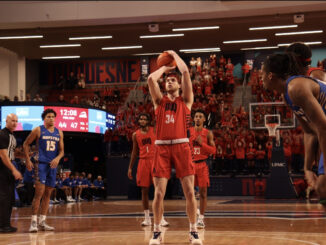
Luke Henne | Sports Editor
Nov. 4, 2021
When Head Coach Keith Dambrot was hired in March 2017 to succeed Jim Ferry, the goal was simple: build an identity for the Duquesne men’s basketball team that would breed success and fan interest in the program.
In the four years since Dambrot took over, the Dukes have improved considerably from where Ferry left the program. A team that won just 10 games in Ferry’s final year (2016-17) saw that number steadily grow to 16 in 2017-18 and 19 in 2018-19.
By the 2019-20 campaign, Duquesne was a program that won north of 20 games. If not for the college basketball postseason being wiped out by Covid-19, the Dukes would’ve likely earned their first postseason berth since Ferry guided the team to a CollegeInsider.com Postseason Tournament appearance in his penultimate year with the program (2015-16).
While last year’s season was marked by canceled games, Covid protocols and roster turnover (including two key players, Lamar Norman Jr. and Sincere Carry, leaving the team during the season), Dambrot still managed to guide the team to a 9-9 record.
Despite the team not participating in any postseason tournament (marking four years without a postseason appearance since Dambrot took over), it’s become clear that Dambrot is a game manager, able to withstand any blows dealt to him and his program.
It’s also clear that Dambrot’s impact stretches beyond the basketball court. In just his second season at the helm, the university announced plans to renovate what is now known as UPMC Cooper Fieldhouse.
While the team had to embrace a nomadic approach for nearly two full seasons worth of home games, they endured the challenges and returned to the refurbished gym for the end of last season. Next week, they’ll finally get the opportunity to play in front of a full house (or, at least a house without attendance restrictions) again.
In four years, Dambrot has built a program with consistency. He’s also built a brand identity, an identity that aided the university’s decision to give the school’s basketball (and volleyball) programs a facility that could compete with other Atlantic 10 Conference institutions.
However, this season will be the ultimate test for Dambrot for a few reasons.
For one, Dambrot lost a lot of his offensive production to the transfer portal. Five of the team’s top five scorers (Marcus Weathers, Tavian Dunn-Martin, Chad Baker, Carry and Norman Jr.) have all left the program and found new homes elsewhere.
The team will also be without the leadership and experience of both Michael Hughes and Maceo Austin moving forward. Hughes left to pursue a professional opportunity in Austria, while Austin announced his intentions to step away from the program in early September.
Every coach across the country is dealing with an abundance or roster turnover, but even this seems like more than most coaches can manage.
The question of whether Dambrot can handle the challenge will soon be answered, but he’s used the portal to his own advantage. Four key additions from the portal (Leon Ayers III, Tre Williams, Rodney Gunn Jr. and Kevin Easley Jr.) are expected to provide valuable minutes for Duquesne this season.
He’ll also have to depend on second-year players like Toby Okani, Andre Harris and Tyson Acuff to take the next step forward, especially in helping to fill the voids left by the veterans who left the program.
Additionally, the program finally has its gem of an arena. Dambrot has to give fans, students and alumni a reason to want to pack the fieldhouse on a nightly basis.
There’s one way to achieve that objective: winning.
For a program that has been mired in mediocrity for such a long time, the combination of a successful program and a state-of-the-art facility might finally be the catalyst that brings more fans into the fieldhouse for each home game.
Dambrot is approaching his fifth season with Duquesne. He finally has the state-of-the-art facility that can supplement the steady growth of the program.
This season, the program needs to take the next step forward and earn a postseason berth for the first time in the Dambrot era.
That journey begins Tuesday when Duquesne welcomes Rider University to the fieldhouse. Fans will come out for the opening game, but they’ll need a reason to keep coming back.
Why would an average fan want to attend a non-conference game against Weber State, American or New Hampshire? What incentive does someone have to head to the arena for a mid-February game against Fordham, a program that’s found itself struggling to escape the A-10 basement for a few years now?
What better reason to have than watching a successful team that competes for conference championships and postseason bids on an annual basis?
Those have to be the goals for this program moving forward.



